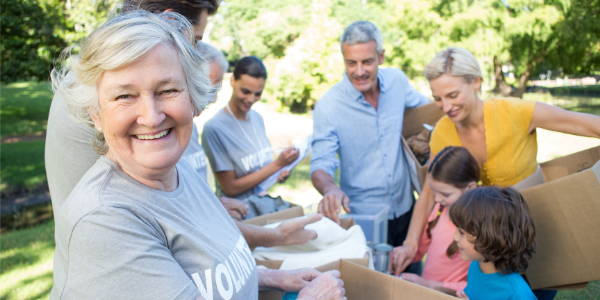Volunteering, supporting, giving back…whether through offering financial, emotional or physical aid is a selfless act of generosity and filling a gap in the community. But did you know that as you light the candle for others, you’re also shining on your own health and well-being?
Not only is philanthropic work an internal boost in morale, studies show that giving back after hitting 40 years can actually make you healthier and will ultimately support a graceful and healthy aging process in a number of ways.
Increasing the Friendship Circle
As the clock of life ticks and we get older, it’s common to lose interest in some of the things that seemed fun and interesting when we were younger. Some may find that time has cut their friendship circle to fit certain people into an aging lifestyle. Finding friends later in life may also be deemed a challenge due to a decrease in social engagements, but it’s possible to find social connections and even a new friend with common interests during give-back sessions.
The more giving back activities aging men and women can organize or get involved in, the more people are mingling and meeting and the larger a friendship circle can grow. As studies show, older age mixed with friends with a common interest in a positive social setting can make the clock of life tick more in your favor.
 Improving Emotional Health
Improving Emotional Health
We are emotional creatures by nature. As we become older, it’s easy to try to shrug off mental health, but in fact, as we grow older, mental health can be impacted even more so due to fluctuations in hormone levels.
By giving back, our emotions glow. That feeling of satisfaction after driving home from a volunteering event or after giving a motivational talk, hot meal or new pair of shoes to someone in need can leave you feeling fulfilled, and can simultaneously leave others feeling cared for, as well.
An Impact on Physical Health
As old age knocks, people tend to neglect tasks that require them to exert or exercise their bodies. While it may feel better to avoid the physical labors, research shows that the less active the body becomes, the higher the odds of suffering from lifestyle-related health problems such as high blood pressure, obesity and various aches and pains. In fact, many chronic aches and pains as we age can be attributed to an increase in sedentary lifestyle habits.
So the next time you decide to participate in a volunteer-based community project, don’t be too quick to skip over the more physically demanding options such as planting trees, bicycle-riding and walk-a-thons for raising money and other physically demanding activities, you’re not just benefiting society but also building your health, training essential muscles and aiding in healthy weight management.
Reduction of Depression and Suicidal Thoughts
According to Mental Health America, at least two million people over the age of 65 suffer from various kinds of depression, and studies show they may also be at risk for accelerated brain aging and even increased thoughts of suicide.
Whether struggling to keep calm after a divorce, the death of a loved one, or the lack of social experiences such as work and everyday outings. To avoid succumbing to stress and depression, consider engaging in volunteer-based activities. Getting closer to people, listening to their life stories, and helping those in need can help provide the courage and motivation to forge ahead. Like many other physical lifestyle habits, participating in more activities as we age can help reduce the experience of stress and onset of depression.
Improve Overall Mental Health
All in all, a generous-hearted person who commits to giving back as they age, tends to have better mental health overall.
Giving back to society is more than a generous act that impacts others, studies have shown that acts of giving are linked to increased mental health and wellness for all involved.





